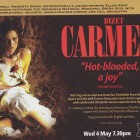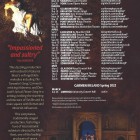Carmen 2022Ellen Kent Productions
Read more about the opera Carmen
Ellen Kent and Opera International, in collaboration with Ollie Rosenblatt's Senbla organization, made a welcome return to Scotland for the first time since the onslaught of the Covid pandemic. A week was spent in Scotland, from Thursday, 28 April to Wednesday, 4 May.
Three popular operas were given - by Bizet (Carmen) and Puccini (Tosca, Madama Butterfly). All three works were seen in Edinburgh, Butterfly and Carmen in Glasgow, and Carmen alone in Perth, on the company's first visit to that city. Dundee and Aberdeen missed out on this occasion.
It is unusual, to say the least, to lead discussion of an operatic performance by reference to current events in the wider world. On this occasion, however, that is essential. Ellen Kent has been bringing companies from Eastern Europe to tour the UK for many years. The present visit, under the management of Senbla, began in January and ends this Sunday. It is impossible to imagine the stress under which these Ukrainian singers and orchestra from the opera house at Kyiv have been living, performing far from home while their families are in constant danger as parts of their country are attacked by Russian armed forces.
The Perth Concert Hall, hosting the company for the first time on Wednesday, was crowded, and the reception was enthusiastic from the start. At the end of the evening the Ukrainian flag was produced on stage, and the company struck up with a highly emotional rendering of their national anthem as the audience stood and cheered. This was an entirely appropriate way to end a performance that showed these artists at their best.
The impressive permanent set was effective at representing the streetscape of Seville at the start and the bull-ring at the end. It was less appropriate for the central inn and mountain scenes, but the performers worked well to make those effective. The chorus sang and danced with plenty of spirit.
The orchestra began the evening playing the prelude at an impressive speed, which was repeated in the final act. The woodwind solos in the various interludes were also beautifully played. This was one of the best orchestras these tours have presented. The excellent conductor, Vasyl Vasylenko, has toured here before. Previously trained in Lviv, with periods in Odessa and even Donbass in the Donetsk region, he is now based in Kyiv. Vasylenko cannot previously have had such impact on the audience.
The Carmen, Katerina Timbaliuk, was touring the UK for the first time. She comes from the opera house at Odessa and made an extremely effective interpreter. Timbaliuk is slender and elegant, and a very good actor, really one of the best players of the part we have seen. The only deficiency seemed perhaps the lack of a vibrant chest register for the scenes of seduction and fortune-telling. But it had been held in reserve, and was highly dramatic as she taunted Don José in the finale.
Carmen's two friends, Frasquita and Mercedes, were also played by newcomers, with vivid interpretations from Anastasiia Blokha and Liudmila Revutscaia. The other principals were familiar from previous tours. Alyona Kistenyova, also based in Odessa, made a full-voiced and unusually dramatic Micaëla.
The toreador, Escamillo, was played by the Moldovan baritone Petru Racovita. He is a veteran of these tours and has been seen in the part for the best part of twenty years. Racovita is unusually tall and elegant, which makes him able to dominate the stage in his famous entrance song. His voice does not have the beautiful smooth delivery of previous years, but he still projects well. The Don José produced much effectively dramatic singing at the tragic climax.
www.ellenkent.com
Performance Cast
- Moralès a corporal of dragoons
-
Vitalii Cebotari (May 4)
- Micaëla a peasant girl
-
Alyona Kistenyova (May 4)
- Don José a corporal of dragoons
-
Vitalii Liskovetskyi (May 4)
- Zuniga a lieutenant of dragoons
-
Valeriu Cojocaru (May 4)
- Carmen a gypsy
-
Katerina Timbaliuk (May 4)
- Frasquita a gypsy, Carmen’s friend
-
Anastasiia Blokha (May 4)
- Mercédès a gypsy, Carmen’s friend
-
Liudmila Revutscaia (May 4)
- Escamillo a toreador
-
Petru Racovita (May 4)
- Dancaïre a smuggler
-
Vitalii Cebotari (May 4)
- Remendado a smuggler
-
Ruslan Pacatovici (May 4)

